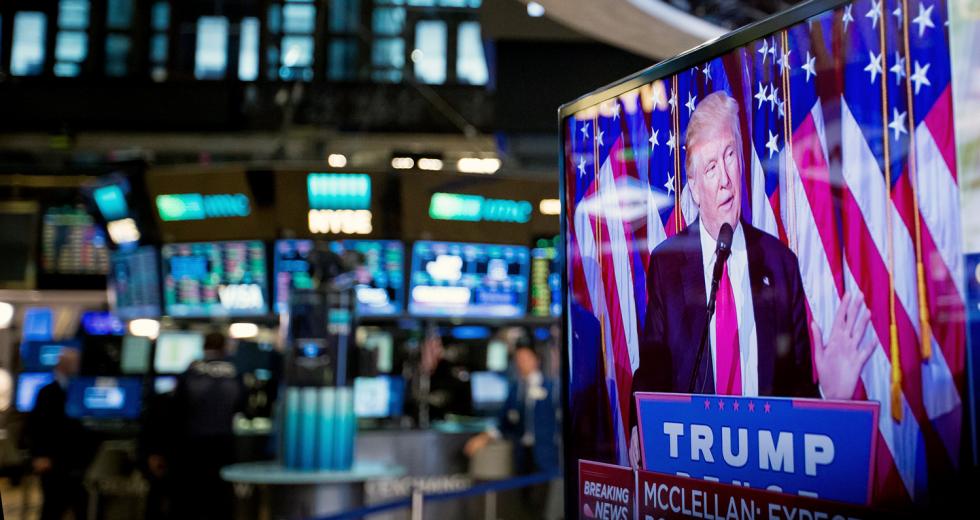U.S. banks stocks jumped the most since May, led by regional lenders, on speculation a Trump presidency could usher in reforms that ease regulatory burdens on financial-services firms.
Financial stocks paced gains among 11 major industry groups in the S&P 500 Index, and the KBW Bank Index rose as much as 3.8 percent, the largest intraday gain for the 24-company index since May 18. New York Community Bancorp’s 6.3 percent increase was the biggest among regional lenders, and Wells Fargo & Co.’s 4.6 percent advance led the biggest U.S. banks.
“We expect a positive snap-back move once investors digest the results and factor in a more favorable regulatory environment for the financial sector,” says Brian Gardner, a Keefe, Bruyette & Woods Inc. analyst, in a note to clients. Gardner says insurers, brokers and asset managers stand to benefit the most from Donald Trump’s election.
Trump was elected the 45th president of the U.S. on Tuesday on a platform that included repealing the Dodd-Frank Act’s strict capital requirements on banks and a proposed temporary moratorium on new financial regulations. Congressional critics of the 2010 legislation say they would scrap the Volcker Rule, which restricts banks with taxpayer-backed deposits from making proprietary trades; reshape the Consumer Financial Protection Bureau; and let banks effectively escape Dodd-Frank if they raise large amounts of additional capital as cushioning for bad times.
Looser Rules
“Donald Trump has advocated in favor of loosened regulations,” Virginie O’Shea, a financial analyst at Aite Group LLC, says in a statement. Trump might “loosen certain regulations in the longer term, such as capital requirements for financial institutions, or maybe eliminate a few specific lines from Dodd-Frank. Although Dodd-Frank is almost implemented, a few areas are still in progress. In the short term, expect the brakes to be put on requirements that are yet to come into force.”
Navient Corp., which collects student loans on behalf of the government, rose 17 percent to $15.73 at 11:43 a.m. in New York, a record intraday gain for the stock and the best performer in the S&P 500 Index. Private student lenders and other for-profit education firms stand to benefit from Trump’s education policies, according to Isaac Boltansky, an analyst at Compass Point Research & Trading LLC.
“Trump has made comments suggesting his preference for banks to take a larger role in higher education lending,” Boltansky says. “A President-elect Trump should be viewed as a broad positive for the education-services space.”
Life insurers also rallied Wednesday, with Primerica Inc. climbing as much as 13 percent, the most since April 2010. The companies were helped by higher bond yields and speculation that Trump’s victory might lead the government to ease some regulation on the sale of retirement products.
“Among the biggest positives is the potential for scaling back regulatory reform,” says John Nadel, an analyst at Credit Suisse Group AG analyst, on Wednesday in a note.
Mexico Impact
Citigroup Inc. was the worst performer on the KBW Index, gaining less than 1 percent. Ken Usdin, an analyst at Jefferies Group LLC, says the impact of a Trump presidency on global trading could hurt the New York-based lender more than its peers.
“Protectionist policies could slow trade with key partners, which could most negatively impact the universal banks,” Usdin says, in a note to clients. “We believe this could have bigger implications for Citi at least sentimentally, with a majority of revenues coming from outside the U.S., including a meaningful presence in Mexico.”
Bank of Nova Scotia, Canada’s third-largest lender by assets, was the worst-performer among lenders in that country. Scotiabank has operations in more than 55 countries, including a sizable retail lender in Mexico. About 5 percent of annual profit in 2015 came from Mexico, according to its annual report.
H&R Block Inc. dropped 4.7 percent to $21.11. Trump said during his campaign that the tax-preparation company will suffer under his plan to simplify the U.S. tax code.



